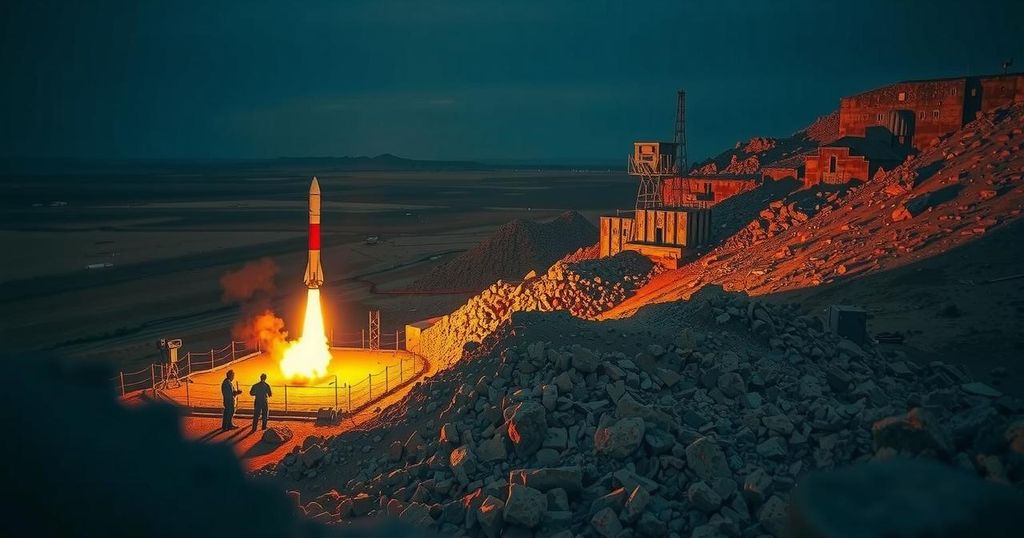Tragic Rocket Attack from Lebanon Claims Lives in Northern Israel

On Thursday, a rocket attack from Lebanon killed five individuals in northern Israel, including four foreign workers, marking the deadliest incident since Israel’s military operation began. The attack occurred amid U.S. diplomatic efforts for ceasefires in the region. Hezbollah has been actively involved in the conflict, launching missiles into Israel, which has responded with airstrikes. The ongoing war has resulted in significant casualties and displacement in both nations.
On Thursday, rocket fire originating from Lebanon resulted in the death of five individuals in northern Israel, marking the deadliest incident since the commencement of Israel’s military operations in the region earlier this month. Among the victims were four foreign workers. This attack coincided with visits by senior United States diplomats who were present in the region advocating for ceasefires in both Lebanon and Gaza, seeking to de-escalate the ongoing conflicts amid the final months of the Biden administration. The militant group Hezbollah has been actively launching rockets, drones, and missiles into Israeli territory, prompting retaliatory strikes from the Israeli military. This escalation followed Hamas’s attack on October 7, 2023, which sparked renewed hostilities in Gaza. Both Hezbollah and Hamas share an alliance backed by Iran, further complicating the geopolitical landscape. Since the onset of the conflict, Israel’s military response has intensified, with significant airstrikes targeting Lebanon, resulting in the death of Hezbollah’s prominent leader and other senior figures. The Israeli Defense Forces reported the recent rocket attack from Metula, Israel’s northernmost town, which has historically suffered from such attacks. Residents of Metula were evacuated last month, leaving only security personnel and agricultural workers in place. Further complicating matters, the Hotline for Refugees and Migrants raised concerns regarding the safety of foreign workers situated near the border, arguing that they were exposed to danger without adequate protection. Israeli officials have designated agricultural areas near the border as closed military zones, limiting access to authorized personnel. Sheikh Naim Kassem, the newly appointed leader of Hezbollah, stated in a video message that the militant faction would continue engaging Israel until the terms for a ceasefire were met, asserting that Hezbollah had recuperated from prior setbacks and was prepared for protracted conflict. Meanwhile, Israel has warned residents in various regions of southern Lebanon to evacuate, as continued airstrikes have reportedly claimed additional lives. Since the beginning of the unrest in Lebanon, over 2,800 individuals have lost their lives, with nearly 13,000 others wounded, according to Lebanese government sources. In Israel, the conflict has claimed the lives of at least 68 individuals, nearly half of whom were military personnel, with continuous evacuations affecting over 60,000 Israelis from border regions for more than a year.
The ongoing conflict between Israel and Lebanon, particularly involving the militant group Hezbollah, stems from historical territorial disputes and periodic escalations of violence. The latest hostilities reignited following Hamas’s attack on Israel, which catalyzed a ripple effect of retaliatory actions. With Hezbollah launching rockets and drones targeting Israeli locations, Israel has responded with significant military action, including airstrikes, leading to a high casualty count on both sides. The involvement of foreign workers and the safety risks associated with their positions near conflict zones underscore broader humanitarian concerns amidst the military engagements. The international community, particularly the United States, has been actively mediating to establish ceasefires, reflecting the wider implications of the regional turmoil.
In summary, the recent rocket attack from Lebanon has tragically resulted in the loss of five lives in northern Israel, underscoring the severity and escalation of the ongoing conflict. As international diplomatic efforts continue to seek a resolution, the humanitarian implications for both Lebanese and Israeli citizens remain profound, with significant casualties and displacement reported. The situation remains fluid, with the potential for further escalation as Hezbollah maintains its resolve against Israeli military actions.
Original Source: apnews.com








